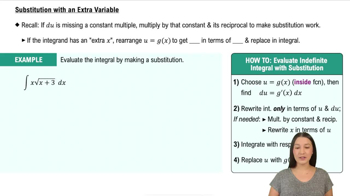Definite integrals Use a change of variables or Table 5.6 to evaluate the following definite integrals.
∫π/₄^π/² (cos 𝓍) / (sin² 𝓍) d𝓍
 Verified step by step guidance
Verified step by step guidance Verified video answer for a similar problem:
Verified video answer for a similar problem:



 5:43m
5:43mMaster Definition of the Definite Integral with a bite sized video explanation from Patrick
Start learning